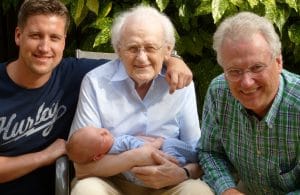
Facing the changes in your loved ones as they age can be hard. Denial can be immensely powerful and may cause you to avoid the truth. But you need to listen to those alarm bells in your head if you are having concerns about your parent’s or loved one’s health or memory. Denial won’t fix or change the health of your loved one and pushing away those feelings can lead to further decline.
If you are worried that your loved one may be showing symptoms of dementia, we can help you identify some of the early signs. And if you are concerned about their wellbeing or safety, we strongly suggest consulting with their primary physician and your local chapter of the Alzheimer’s Association for more help.
What is Dementia?
Dementia is a term that refers to mental decline and a person’s ability to manage their daily life and complete everyday tasks. It is not one specific disease but an overall term that describes a group of symptoms associated with a decline in cognitive ability. The most common type of dementia is Alzheimer’s. Often occurring after a stroke, the second most common type is vascular dementia. Other common dementias are Lewy body disease and Frontotemporal.
Lewy body disease (also referred to as LBD) is named after scientist Friederich H. Lewy who discovered abnormal protein deposits that disrupted the normal functioning of the brain. Lewy body disease is known to cause a wide range of symptoms, including hallucinations, changes in alertness, stiffness, posture issues, and confusion. Due to LBD, the brain chemical acetylcholine is depleted and causes disruptions in thinking, behavior, and perception.
Frontotemporal dementia (also referred to as FTD) is a clinical syndrome associated with the shrinkage of the frontal and temporal anterior lobes of the brain. The typical symptoms involve changes in behavior, such as inappropriate social behavior, agitation, or impulsiveness, and problems with language, such as difficulty making or understanding speech. Often FTD runs in families, so there is a genetic component.
What Causes Dementia?
Dementia occurs when there is damage to the nerve cells in the brain. The reasons and symptoms may vary depending on the cause. Some diseases have been known to cause dementia: Parkinson’s, Creutzfeldt-Jakob, and Wernicke-Korsakoff, to name a few. Medical conditions can also cause dementia-like symptoms, including depression, Vitamin B12 deficiency, hydrocephalus (water on the brain), tumors, Thyroid disease, and alcoholism. Drug interactions have also been known to cause dementia-type symptoms. As our loved ones age and take more medications, they can be vulnerable to the adverse effects of drug interactions. Even commonly prescribed and over-the-counter medications can cause issues, like antihistamines, sedatives, and antidepressants. Therefore, it is important to monitor and note your loved one’s behavior over an extended period. Make an appointment with their physician to share the signs and symptoms that you have noticed.
Symptoms of Dementia
The symptoms that your loved one may experience are as unique as the individual. And symptoms can change with the progression of the disease. The most common symptom of dementia is memory loss, typically referring to short-term memories. Some people with dementia retain memories of childhood but can’t remember what they ate for lunch. Many conditions are progressive, and symptoms can worsen or intensify over time. Forgetful moments are common with age. But if changes in memory, personality, or behavior begin to affect their quality of life and productivity, it is time to consult with their physician.
Early Signs of Dementia
1. Problems with Vision
Some people who struggle with dementia have problems reading or experience issues determining colors and contrasts. They may also find it is difficult to drive due to problems with spatial reasoning and judging distance. Vision changes are often linked to dementia. Vision issues can cause significant problems with everyday tasks and one’s ability to stay mobile.
2. Mood and Personality Changes
Many family members and friends have noted that one of the significant signs of dementia is a change in their loved one’s mood or personality. People who were always joyful and happy when they were healthy may become confused, suspicious, depressed, fearful, or anxious when mental decline begins. And these issues can amplify when they are out of their comfort zone. Because of this, people in the earlier stages of Alzheimer’s will often stick to a specific routine and become annoyed or anxious when their schedule is interrupted.
3. Poor Judgment and Difficulty Making Decisions
Another important side effect of dementia occurs when a person experiences changes in his or her judgment, which can lead to serious issues with the way one handles money. For example, a person who was usually on-time with payments may forget to handle monthly utilities or give large sums of money to telemarketers when he or she typically avoided such activities in the past. If a person develops dementia or Alzheimer’s, they may eventually be unable to manage the household bills.
4. Misplacing or Losing Things
One warning sign that is extremely common for individuals in the beginning stages of dementia is placing everyday items in strange or unusual places. Usually, it is due to a lack of connection between space and time. Once they begin to lose these things, they may be unable to trace back their steps so that they can find the item. Unfortunately, misplacing things is one of those symptoms that progresses over time as dementia worsens.
5. Forgetfulness
Even if it is recently learned information, individuals with dementia will have trouble recollecting these thoughts—both in the long- or short-term. For example, the mental decline may cause your loved one to forget important dates or events that are critical to their long-term memory, such as a child’s birthday, the correct way to use the microwave, or the highway they need to take to get home. However, this can happen with short-term memory as well, such as the ability to recall online passwords, names of people they have recently met, appointment dates, or the grocery list.
Diagnosing Dementia
Not all episodes of forgetfulness may be early signs of Alzheimer’s or other dementias; it may just be normal aging. However, multiple experiences that accumulate over time may be a cause to visit a physician to discuss the symptoms or get tested.
A complete medical and neuropsychological evaluation is used to determine if a person has cognitive challenges and, if so, how severe those issues may be. The next step is to determine the cause and recommendation for treatment and course of action.
The medical evaluation includes:
- Medical history and prescribed medications
- Onset history of symptoms, such as changes in thinking, day-to-day function, and behavioral changes
- Neurologic exam
- Lab test for any vitamin deficiencies
- Brain imaging
- Cognitive testing
Unfortunately, there is no definitive test to determine that someone has dementia. Over recent years, the process of diagnosing dementia has become more accurate. Occasionally, patients will have a combination of causes contributing to their symptoms, which can take some time to monitor. Determining a cause is the most important step to guide treatment and future care. Doctors often can diagnose someone with dementia with a high level of certainty. The more complicated part is determining the exact type of dementia.
Risk Reduction and Treatment for Dementia
Age and genetics are two risk factors for dementia that cannot be changed. But research shows that a healthy lifestyle can decrease the risk of cognitive decline and dementia. Incorporate a healthy diet and proper hydration into your loved one’s daily routine. Encourage them to exercise regularly and make sure to control their cholesterol, blood pressure, diabetes, and keep a healthy weight. Help them to stop smoking which can contribute to an increased risk. And try to look for ways to mentally stimulate their mind, including puzzles, learning a language, reading, trying brain exercises, and even challenging video games. Social interaction is vital for a senior’s health, so encourage them to remain socially active.
In some cases, health conditions can cause dementia-type symptoms that can be reversed. Medication interactions, depression, vitamin deficiencies, thyroid issues, and even dehydration can cause memory loss or confusion in older adults. When these conditions are found early, treatments can improve symptoms.
There is no cure for dementia, but some treatments can help to lessen symptoms. Maintaining a healthy lifestyle with good nutrition and exercise is not only a good preventative measure, but it may help slow the progression of dementia. Medications may be prescribed to help manage symptoms. Therapy can help improve day-to-day functions and overall mood. Therapy options can range from music and art to behavioral therapy and cognitive stimulation therapy. Professional counseling can also provide a support system and help treat depression or anxiety.
Practical steps can better alleviate the stress for the person with dementia. A full-time caregiver can provide regular support and safety. External memory aids like an alarm, reminders, message boards, and written notes can be helpful guides to reduce confusion. Establishing a daily routine can help with independence and provide a sense of stability. Stress management can keep individuals with dementia calm. Encourage your loved one to try meditation, pet interaction, music, gentle exercise, and social interaction. And lastly, modify their environment to be stress-free and peaceful by eliminating loud noises, bad lighting, too much pattern or color, and highly reflective surfaces, which may cause agitation and anxiety.
How to Care for a Loved One with Dementia
Caring for someone with Alzheimer’s or another form of dementia can be challenging and overwhelming on the best of days. Your loved one with dementia will develop uncharacteristic behaviors, have bad days, or ask questions repeatedly. Frustration is a valid feeling, but it shouldn’t define how you feel about caregiving. These negative emotions can lead to stress, depression, and even anger. They won’t benefit you as a caregiver or be helpful in managing the care of your elderly loved one. Learn to recognize when you are getting frustrated and how to handle those negative feelings by caring for yourself, asking for help, and taking a break.
At Aegis Living, we have been working with residents in many different stages of memory loss and their families for over two decades. Our Life’s Neighborhood™ meets each resident where they are in their memory loss and their current perceptions of themselves and the world around them. With patience, dignity, and a host of tools and redirection techniques, our staff can help our residents live in the moment with joy. Features and vignettes in our memory care communities offer reminders of yesteryear to spark fond memories, like a vintage Airstream trailer, traditional campsite, or lakeside setting to remind residents of past family vacations. Our goal is for each resident to enjoy activities and time spent with others for a better quality of life.
At Aegis Living, our communities are equipped to handle the unique mental and physical limitations associated with memory loss. Our Life’s Neighborhoods ™ are closely monitored for the safety and care of our residents. Each memory care community includes secured outside gardens, walking paths, chef-prepared nutritional meals, compassionate nursing staff, and caregivers specifically trained to care for people living with dementia and Alzheimer’s. If your loved one can no longer live on their own, contact one of our communities today to take a tour.
